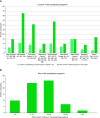Impact of the COVID-19 Pandemic on U.S. Pulmonary and Critical Care Medicine Fellowship Training
- PMID: 35083462
- PMCID: PMC8787736
- DOI: 10.34197/ats-scholar.2021-0067OC
Impact of the COVID-19 Pandemic on U.S. Pulmonary and Critical Care Medicine Fellowship Training
Abstract
Background: Although it is well known that the coronavirus disease (COVID-19) pandemic has had a profound effect on health care, its impact on fellowship training in Pulmonary and Critical Care Medicine (PCCM) has not been well described.
Objective: We conducted an anonymous survey of PCCM program directors (PDs) to assess the impact of the COVID-19 pandemic on PCCM fellowship training across the United States.
Methods: We developed a 30-question web-based survey that was distributed to U.S. PCCM PDs through the Association of Pulmonary and Critical Care Medicine Program Directors.
Results: The survey was sent to 242 PDs, of whom 28.5% responded. Most of the responses (76.8%) came from university-based programs. Almost universally, PDs reported a decrease in the number of pulmonary function tests (100%), outpatient visits (94.1%), and elective bronchoscopies (96%). Three-quarters (77.6%) of the PDs reported that their PCCM fellows spent more time in the intensive care unit than originally scheduled.
Conclusion: The COVID-19 pandemic has had a variable impact on different aspects of fellowship training. PDs reported a significant decrease in the core components of pulmonary training, whereas certain aspects of critical care training increased. It is likely that targeted mitigation strategies will be needed to ensure no gaps in PCCM training while optimizing well-being.
Keywords: COVID-19; PCCM fellowship; training.
Copyright © 2021 by the American Thoracic Society.
Figures



Comment in
- doi: 10.34197/ats-scholar.2021-0122ED
References
-
- Johns Hopkins University. 2021. https://coronavirus.jhu.edu/map.html - PubMed
-
- Grasselli G, Pesenti A, Cecconi M. Critical care utilization for the COVID-19 outbreak in Lombardy, Italy: early experience and forecast during an emergency response. JAMA . 2020;323:1545–1546. - PubMed
-
- Wu Z, McGoogan JM. Characteristics of and important lessons from the coronavirus disease 2019 (COVID-19) outbreak in China: summary of a report of 72 314 cases from the Chinese Center for Disease Control and Prevention. JAMA . 2020;323:1239–1242. - PubMed
-
- Jacobo J, Mitropoulos A. Hospital ICUs running out of space due to COVID-19 surges across the country. ABC News; 2020https://abcnews.go.com/Health/hospital-icus-running-space-due-covid-19-s...
LinkOut - more resources
Full Text Sources
Miscellaneous

